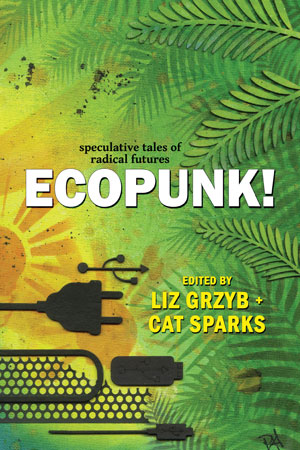
Over coming weeks we'll have a series of mini interviews ("minterviews" if you will) with some of the awesome writers in our forthcoming Ecopunk! (check it out on kickstarter http://kck.st/2xGeJ9x)
Next up is DK Mok.DKis a fantasy and science fiction author whose novels include Squid’s Grief and Hunt for Valamon. DK has been shortlisted for four Aurealis Awards, two Ditmars and a WSFA Small Press Award. DK graduated from UNSW with a degree in Psychology, pursuing her interests in both social justice and scientist humour. DK lives in Sydney, Australia, and her favourite fossil deposit is the Burgess Shale.
1. Tell us a little about your Ecopunk! story, and the inspiration behind it.
I love libraries. As a child, my local libraries were enchanted places full of wonder and adventure. In high school, libraries were my sanctuary, where I found solace, inspiration and fuel for my curiosity. Now, libraries are still a crucial source of information and creative sustenance for me.
A few years ago, I came across a book called Improbable Libraries by Alex Johnson. And it was here that I learned of the Biblioburro.
Under a chapter entitled ‘Animal Libraries’, I learned of primary school teacher Luis Soriano and his two donkeys, carrying books to remote communities in Colombia. I learned of an elephant called Boom-Boom, bringing fairy tales and dinosaur books to children in Laos; camel libraries in Kenya; Donkey Drawn Libraries in Zimbabwe; nomadic writers on reindeer in Mongolia. All over the world, there are passionate people braving deserts, storms and bandits to bring books to children in isolated communities.
My story, "The Wandering Library", was inspired by these heroic champions of literacy and education. It follows the journey of Lani Bashir, a travelling librarian, as she navigates a world transformed by rising seas and genetically modified creatures, visiting communities powered by sun, wind, sea and cheese.
2. What science fictional technology do you wish we had now?
Airships! Giant solar-powered airships! I love the idea of floating hotels, airborne villages, flying hospitals. Airships are great because the vertical lift-off and landing means they’re not reliant on runways, roads or ports, so previously inaccessible areas are much easier to reach. They’re also readily scalable, so theoretically you could have a tiny flying library or a sprawling floating city.
I think this technology could be transformative: imagine dropping fully equipped, fully staffed hospitals into epidemic hot-zones; or shipping entire camps of emergency housing, food and aid workers into -- or out of -- disaster-hit regions; or travelling museums and galleries visiting remote communities.
We already have most of the technology, and while speed of travel is a limiting factor, I’d love to see airships become a sustainable form of transport in the near future.
3. With all these scary climate events happening at the moment, it's sometimes hard to see some light. What gives you the most hope for humanity and the world?
I draw inspiration from those who are taking action to make the world a better place -- and there are plenty of them. From humanitarian organisations like Malala Fund, working to ensure that every girl has access to quality education, to high-tech companies like BioCarbon Engineering, restoring ecosystems on an industrial scale with the use of tree-planting aerial drones. From activists like ClientEarth, using environmental law to hold governments to account, to science literacy programs like Skype a Scientist, connecting disadvantaged students around the world to diverse, working scientists. And the list goes on.
Look locally, and you’ll find people supporting libraries and knowledge centres, community solar projects, and waste reduction initiatives; people pushing their local governments for greater sustainability, more energy independence, more green space.
If you want a regular dose of innovation and activism, I highly recommend podcasts like Science Friday, BBC Click Radio, and BBC People Fixing the World. Be inspired, and then take action. Because hope arises from taking action.
--
Ecopunk! - speculative tales of radical futures contains 19 optimistic tales, selected by two award-winning editors, showing how humanity can survive and flourish, despite the looming uncertainty from climate change. The incredible line-up includes some of Australia's best science fiction writers.